动词时态和语态总结
高中语法动词的时态和语态

一、一般现在时1、表示经常发生的习惯性的、现在反复出现的动作或状态,常用的时间状语有:always,usually,seldom, sometimes, every day, now and then, once a week等。
2、表示眼下或目前等现在时间所发生的动作或存在的状态,这种状态带有一定的持续性。
3、表示客观事实或普遍真理。
4、书报的标题,故事的叙述,小说、戏剧、电影等情节介绍,图片的说明等。
5、时间表、时刻表、日程表、节目单、课程表等按规定将要发生的动作,只限于go, arrive, leave, start, stay, return, begin, come等动词。
6、在时间、条件、方式、让步状语从句中,表示将来的动作。
注意:一般现在时可以用于定语从句或宾语从句中表示将来。
7、用在某些表达中,表示现在正在发生的动作或存在的状态。
Here comes the bus!How it rains!二、一般过去时1、表示在过去某一时间点发生的动作或所处的状态,与现在没有关系。
常用的时间状语有:yesterday, last night, at that time等。
2、表示在过去某一段时间里反复出现的动作或状态,与现在没有关系。
3、用used to do或would do表示过去经常或反复发生的动作。
4、有些情况发生的时间没清楚表明,但实际上是“刚才,刚刚”发生的,属于过去时间,应使用过去时态。
常见的有I didn’t know…或I forgot…等。
5、一般过去时可与today, this week, this month等时间状语连用。
三、一般将来时1、will/shall do(1)表示将来会出现的动作或状态。
常用的时间状语:this evening, tomorrow, next week/month…,at the end of this term, in a few minutes等。
知识点动词时态与语态总结

知识点动词时态与语态总结动词时态和语态是语法中的重要概念。
正确地使用时态和语态,可以使语言更加准确、简洁、流畅。
在此总结了一些常见的动词时态和语态,帮助读者更好地理解和应用。
一、时态1. 一般现在时:描述客观事实、永恒真理、习惯行为或科学事实等。
例如:I live in New York.2. 现在进行时:描述正在进行的动作或暂时的情况。
例如:I am studying English.3. 一般过去时:描述过去发生的事情或习惯行为。
例如:She traveled to Europe last year.4. 过去进行时:描述过去某一时刻正在进行的动作。
例如:They were watching a movie when I called them.5. 现在完成时:描述已经完成的动作对目前造成的影响。
例如:I have finished my homework.6. 过去完成时:描述过去某一时间或动作之前已经完成的事情。
例如:They had already left when we arrived.7. 将来时:描述将来发生的动作或状态。
例如:I will call you tomorrow.二、语态1. 主动语态:强调主语进行动作或承担责任。
例如:She wrote a beautiful poem.2. 被动语态:强调动作的接受者或对主语的影响。
例如:The letter was delivered by the postman.总结:时态和语态的正确运用可以准确地表达语义,增强表达的准确性。
要注意动词的时态和语态应与主语和上下文相一致。
在写作中,要根据实际情况和需要选择合适的时态和语态,以达到最佳的表达效果。
熟练掌握动词的时态和语态用法,可以使文章更具逻辑性和连贯性。
这就是知识点动词时态与语态的总结,希望对你有所帮助。
请牢记并灵活运用这些知识,以提高英语表达的准确性和流利性。
英语动词时态和语态
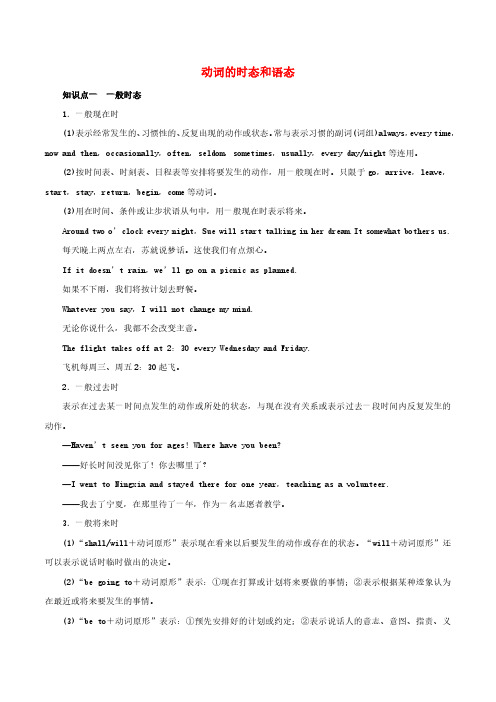
动词的时态和语态知识点一一般时态1.一般现在时(1)表示经常发生的、习惯性的、反复出现的动作或状态。
常与表示习惯的副词(词组)always,every time,now and then,occasionally,often,seldom,sometimes,usually,every day/night等连用。
(2)按时间表、时刻表、日程表等安排将要发生的动作,用一般现在时。
只限于go,arrive,leave,start,stay,return,begin,come等动词。
(3)用在时间、条件或让步状语从句中,用一般现在时表示将来。
Around two o’clock every night,Sue will start talking in her dream.It somewhat bothers us.每天晚上两点左右,苏就说梦话。
这使我们有点烦心。
If it doesn’t rain,we’ll go on a picnic as planned.如果不下雨,我们将按计划去野餐。
Whatever you say,I will not change my mind.无论你说什么,我都不会改变主意。
The flight takes off at2:30every Wednesday and Friday.飞机每周三、周五2:30起飞。
2.一般过去时表示在过去某一时间点发生的动作或所处的状态,与现在没有关系或表示过去一段时间内反复发生的动作。
—Haven’t seen you for ages!Where have you been?——好长时间没见你了!你去哪里了?—I went to Ningxia and stayed there for one year,teaching as a volunteer.——我去了宁夏,在那里待了一年,作为一名志愿者教学。
3.一般将来时(1)“shall/will+动词原形”表示现在看来以后要发生的动作或存在的状态。
动词时态和语态总结
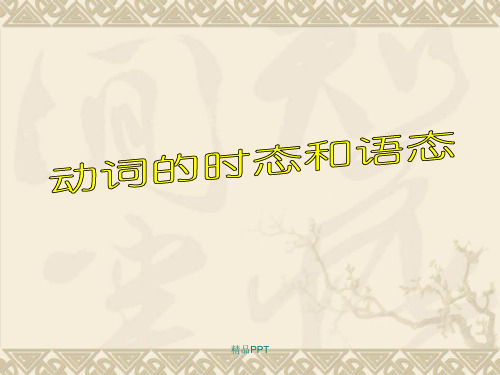
四、现在进行时 1.表示说话时正在进行而尚未完成的动作或状态。
We are having an English lesson. 2.表示现阶段一直在进行的动作,但说话时不一定正在进行。
The workers are building a new factory.
3.有时可表示即将发生的动作〔只限于go, come, stay, leave, start, begin, arrive, return, fly, drive等动词〕这时常有一个
played table tennis almost everyday. 4〕在条件、时间状语从句中表示过去将来的动作。
They said they wo精u品lPdPTlet us know if they heard any news about him.
三. 一般将来时 一般将来时表示将来要发生的动作和存
精品PPT
二、一般过去时 1〕表达特定的过去时间内发生的动作或存在的状况,
常与last week/year/ month/ spring, a few days ago, in 1998等时间状语以及when等连词引
导的时间状语从句连用。
We had a good swim last Sunday.
3〕用在问句中,表示委婉礼貌; Will you be reading anything else? When shall we be meeting again?
When I was young, I took cold baths regularly. 2〕表达过去连续发生的一件件事。
He got up early in the morning, fetched water,
高中英语知识点归纳动词的时态与语态总结
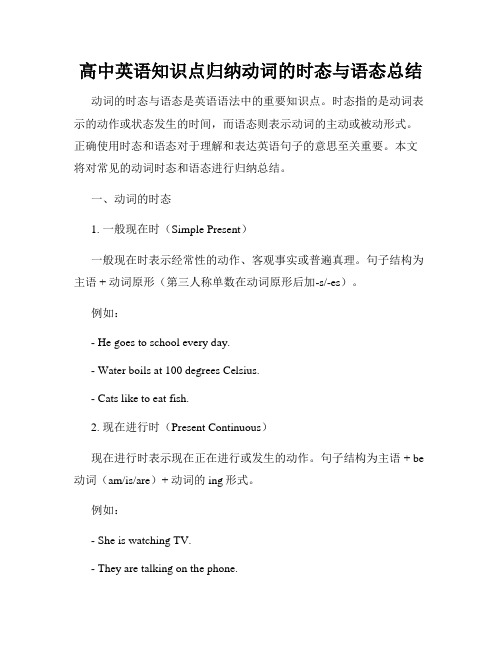
高中英语知识点归纳动词的时态与语态总结动词的时态与语态是英语语法中的重要知识点。
时态指的是动词表示的动作或状态发生的时间,而语态则表示动词的主动或被动形式。
正确使用时态和语态对于理解和表达英语句子的意思至关重要。
本文将对常见的动词时态和语态进行归纳总结。
一、动词的时态1. 一般现在时(Simple Present)一般现在时表示经常性的动作、客观事实或普遍真理。
句子结构为主语 + 动词原形(第三人称单数在动词原形后加-s/-es)。
例如:- He goes to school every day.- Water boils at 100 degrees Celsius.- Cats like to eat fish.2. 现在进行时(Present Continuous)现在进行时表示现在正在进行或发生的动作。
句子结构为主语 + be 动词(am/is/are)+ 动词的ing形式。
例如:- She is watching TV.- They are talking on the phone.- We are studying for the exam.3. 一般过去时(Simple Past)一般过去时表示发生在过去的动作或状态。
句子结构为主语 + 动词过去式。
例如:- I visited my grandparents last weekend.- He studied English in high school.- They went to the concert together.4. 过去进行时(Past Continuous)过去进行时表示过去某个时间点正在进行或发生的动作。
句子结构为主语 + was/were + 动词的ing形式。
例如:- She was cooking dinner when I called her.- They were playing soccer at the park yesterday.- We were watching a movie when the power went out.5. 一般将来时(Simple Future)一般将来时表示将来某个时间要发生的动作。
初中英语动词的时态与语态总结
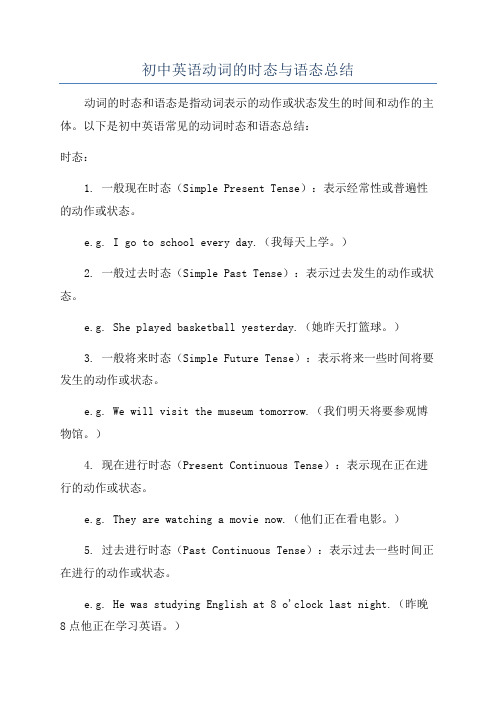
初中英语动词的时态与语态总结动词的时态和语态是指动词表示的动作或状态发生的时间和动作的主体。
以下是初中英语常见的动词时态和语态总结:时态:1. 一般现在时态(Simple Present Tense):表示经常性或普遍性的动作或状态。
e.g. I go to school every day.(我每天上学。
)2. 一般过去时态(Simple Past Tense):表示过去发生的动作或状态。
e.g. She played basketball yesterday.(她昨天打篮球。
)3. 一般将来时态(Simple Future Tense):表示将来一些时间将要发生的动作或状态。
e.g. We will visit the museum tomorrow.(我们明天将要参观博物馆。
)4. 现在进行时态(Present Continuous Tense):表示现在正在进行的动作或状态。
e.g. They are watching a movie now.(他们正在看电影。
)5. 过去进行时态(Past Continuous Tense):表示过去一些时间正在进行的动作或状态。
e.g. He was studying English at 8 o'clock last night.(昨晚8点他正在学习英语。
)6. 将来进行时态(Future Continuous Tense):表示将来一些时间正在进行的动作或状态。
e.g. They will be playing soccer at 4 pm tomorrow.(他们明天下午4点将正在踢足球。
)7. 现在完成时态(Present Perfect Tense):表示过去一些时间开始的动作一直持续到现在,或者与现在有关系的过去动作或状态。
e.g. I have lived in this city for 10 years.(我在这个城市住了10年了。
动词的用法归纳总结

动词的用法归纳总结动词是语言中非常重要的一部分,是表达动作、状态、感觉和心理活动的重要手段。
在汉语中,动词的使用具有丰富的内涵和广泛的应用,可以通过时态、语气、语态等方式来表达不同的意义。
以下是关于动词的用法的归纳总结,希望对你有所帮助。
一、动词的基本用法:1. 表示动作或状态:如“跑、写、喜欢、是”等2. 搭配时间状语或地点状语,表示动作的时间、地点:如“在家里学习”、“昨天去了公园”等二、动词的时态:1. 现在时:表示现在进行的动作或状态,如“我在吃饭”、“他喜欢唱歌”。
2. 过去时:表示过去发生的动作或状态,如“昨天我看了一部电影”、“他在学校读书”。
3. 将来时:表示将来要发生的动作或状态,如“明天我要去旅游”、“他将来会成为一名医生”。
三、不同动词的用法:1. 及物动词:需要接受动作的宾语,如“吃、看、读”,需要接宾语才能完整表达意思。
2. 不及物动词:不需要接受动作的宾语,自身就可以表达完整的意思,如“跑、笑、睡”。
四、动词的语气:1. 虚拟语气:表示假设、愿望等,如“要是我有时间就去”、“希望他早点回来”。
2. 祈使句:表示请求、命令等,如“请你帮我一个忙”、“快点走!”。
五、动词的语态:1. 主动语态:主语是动作的执行者,如“老师讲课”、“他写信”。
2. 被动语态:主语是动作的承受者,如“这本书被我借走了”、“他被邀请参加了会议”。
以上是对动词的用法做了简单的总结,希望可以帮助你更好地理解和运用动词。
动词在语言中起着非常重要的作用,掌握动词的用法对于提高语言表达能力有着重要的意义。
动词的用法还有很多细节和复杂之处,需要我们在实际运用中不断学习和提高。
高中英语语法总结大全之动词的时态_语态

动词的时态、语态一般现在时的用法1) 经常性或习性的动作,常与表示频度的时间状语连用。
时间状语:every…, sometimes, at…, on SundayI leave home for school at 7 every morning.2) 客观真理,客观存在,科学事实。
The earth moves around the sun. Shanghai lies in the east of China.3) 表示格言或警句中。
Pride goes before a fall. 骄者必败。
注意:此用法如果出现在宾语从句中,即使主句是过去时,从句谓语也要用一般现在时。
例:Columbus proved that the earth is round..4) 现在时刻的状态、能力、性格、个性。
Ann writes good English but does not speak well.比较:Now I put the sugar in the cup. I am doing my homework now.5)在连词when, while, if, unless, as soon as等引导的时间状语从句和条件状语从句中,用一般现在时态代替将来时。
Unless some extra money is found, the theatre will close.现在完成时现在完成时用来表示动作或状态发生在过去但它的影响现在还存在;也可表示持续到现在的动作或状态。
其构成: have (has) +过去分词。
Ann has worked for a long time to realize his dream and now he is popular.比较过去时与现在完成时1)过去时表示过去某时发生的动作或单纯叙述过去的事情,强调动作;现在完成时为过去发生的,强调过去的事情对现在的影响,强调的是影响。
动词的时态和语态

【翻译句子】 (7) He told me he read an interesting novel last night. 他告诉我他昨晚看了一本有趣的小说。 【结论2】如果从句中有一个过去的时间状语,尽 管从句中的动作先于主句发生,但从句中的谓语动 词仍用过去式。 【结论3】表示两个紧接着发生的动作,常由以下 词语连接,用一般过去时。常见连词有:but, and, when, as soon as, immediately, the moment, the minute。 如 : He rushed into the room and sat down immediately.
【疑难2】 We had no sooner been seated than the bus started. = No sooner had we been seated than the bus started. 【疑难剖析2】hardly / scarcely…when (before);no sooner…than表示“一……就……”。
3. 一般将来时 【翻译句子】 (8)我们下周将会讨论这个话题。 We will talk about this topic next week. 【结论1】表示未来的动作或状态常用will / shall + 动词(常与表示将来的时间状语连用,如tomorrow, next week等)。
【翻译句子】 (9) The bus is coming. 公共汽车就要到了。 【结论2】表示一种趋向或习惯动作。表示趋向行 为的动词,如come,go,start,begin,leave等词, 常用进行时的形式表示将来时。
【疑难2】The room remains clean. You are allowed to speak here. 【疑难剖析2】下面四类动词不宜用现在进行时: a. 表示心理状态、情感的动词:like, love, hate, care, remember, believe, want, mind, wish, agree, mean, need。 b. 表存在的状态的动词:appear, exist, lie, remain, seem, belong to, depend on。 c. 表示瞬间动作的动词:allow, accept, permit, promise, admit, complete。 d. 表示感官的动词:see, hear, notice, feel, smell, sound, taste, look。
16种动词的时态和语态

【主动语态】一般现在时:do一般过去时:did一般将来时:willdo现在进行时:be doing(be随人称变化)过去进行时:was/weredoing现在完成时:have/has done过去完成时:had done过去将来时:woulddo将来完成时:will have done将来进行时:will be doing将来完成进行时:will have been doing现在完成进行时:have been doing过去将来完成时:would have done过去完成进行时:had been doing过去将来进行时:would be doing过去将来完成进行时:would have been doing【被动语态】一般现在时:be done(be随人称变化)一般过去时:was/were done一般将来时:will be done现在进行时:be being done(前面的be随人称变化,后面的being固定)过去进行时:was/were being done(being固定)现在完成时:have/has been done过去完成时:had been done过去将来时:would be done将来完成时:will have been done将来进行时:will be being done(being固定)将来完成进行时:will have been being done现在完成进行时:have been being done过去将来完成时:would have been done过去完成进行时:had been being done过去将来进行时:would be being done过去将来完成进行时:would have been being done。
英语动词的时态与语态用法总结
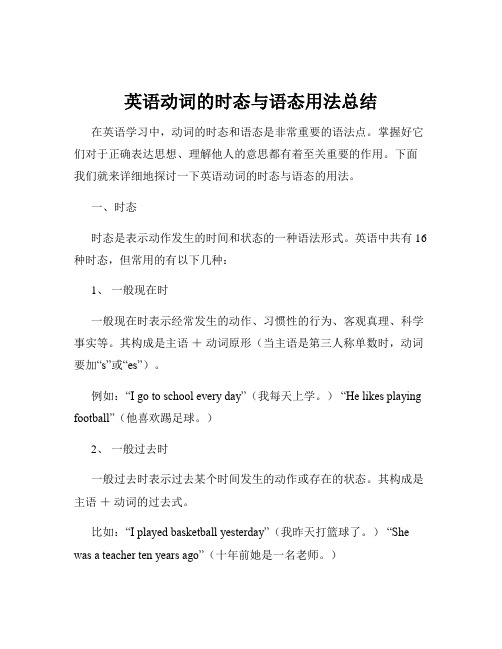
英语动词的时态与语态用法总结在英语学习中,动词的时态和语态是非常重要的语法点。
掌握好它们对于正确表达思想、理解他人的意思都有着至关重要的作用。
下面我们就来详细地探讨一下英语动词的时态与语态的用法。
一、时态时态是表示动作发生的时间和状态的一种语法形式。
英语中共有 16 种时态,但常用的有以下几种:1、一般现在时一般现在时表示经常发生的动作、习惯性的行为、客观真理、科学事实等。
其构成是主语+动词原形(当主语是第三人称单数时,动词要加“s”或“es”)。
例如:“I go to school every day”(我每天上学。
)“He likes playing football”(他喜欢踢足球。
)2、一般过去时一般过去时表示过去某个时间发生的动作或存在的状态。
其构成是主语+动词的过去式。
比如:“I played basketball yesterday”(我昨天打篮球了。
)“She was a teacher ten years ago”(十年前她是一名老师。
)3、一般将来时一般将来时表示将来要发生的动作或存在的状态。
常见的构成方式有“will +动词原形”和“be going to +动词原形”。
像:“I will visit my grandparents next week”(下周我将去看望我的祖父母。
)“It is going to rain”(要下雨了。
)4、现在进行时现在进行时表示正在进行的动作。
其构成是“be +动词的现在分词”。
例如:“They are having a meeting now”(他们正在开会。
)5、过去进行时过去进行时表示过去某个时刻正在进行的动作。
其构成是“was/were +动词的现在分词”。
比如:“I was reading a book at eight o'clock last night”(昨晚八点我正在读书。
)6、现在完成时现在完成时表示过去发生的动作对现在造成的影响或结果,或者过去开始的动作一直持续到现在。
动词的时态和语态
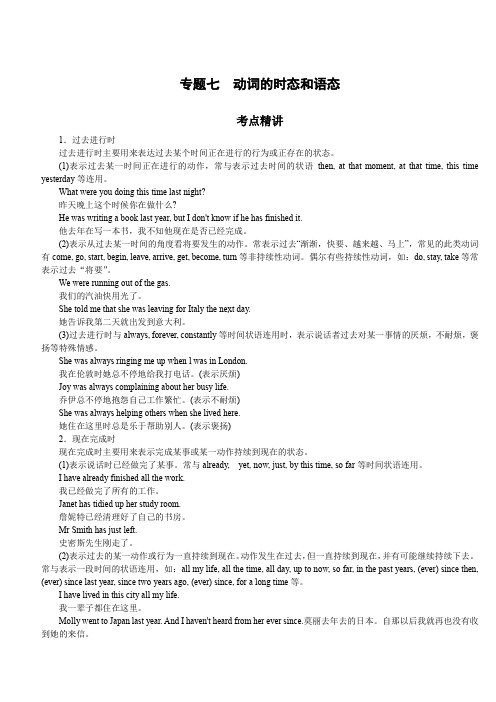
专题七动词的时态和语态考点精讲1.过去进行时过去进行时主要用来表达过去某个时间正在进行的行为或正存在的状态。
(1)表示过去某一时间正在进行的动作,常与表示过去时间的状语then, at that moment, at that time, this time yesterday等连用。
What were you doing this time last night?昨天晚上这个时候你在做什么?He was writing a book last year, but I don't know if he has finished it.他去年在写一本书,我不知他现在是否已经完成。
(2)表示从过去某一时间的角度看将要发生的动作。
常表示过去“渐渐,快要、越来越、马上”,常见的此类动词有come, go, start, begin, leave, arrive, get, become, turn等非持续性动词。
偶尔有些持续性动词,如:do, stay, take等常表示过去“将要”。
We were running out of the gas.我们的汽油快用光了。
She told me that she was leaving for Italy the next day.她告诉我第二天就出发到意大利。
(3)过去进行时与always, forever, constantly等时间状语连用时,表示说话者过去对某一事情的厌烦,不耐烦,褒扬等特殊情感。
She was always ringing me up when l was in London.我在伦敦时她总不停地给我打电话。
(表示厌烦)Joy was always complaining about her busy life.乔伊总不停地抱怨自己工作繁忙。
(表示不耐烦)She was always helping others when she lived here.她住在这里时总是乐于帮助别人。
动词的时态和语态知识总结

动词的时态和语态知识总结一、动词的时态时态是指动词所表示的动作或状态发生的时间。
英语中常用的时态有以下几种:一般现在时、一般过去时、一般将来时、现在进行时、过去进行时、将来进行时、现在完成时、过去完成时、将来完成时等。
1. 一般现在时一般现在时表示经常性、习惯性的动作或客观事实。
常与频率副词如always、often、usually等连用。
例如:- I often go to the gym.- He always arrives on time.2. 一般过去时一般过去时表示过去某个时间发生的动作或存在的状态。
常与表示过去的时间状语连用。
例如:- I visited my grandparents last weekend.- She lived in Paris for two years.3. 一般将来时一般将来时表示将来某个时间要发生的动作或存在的状态。
常与表示将来的时间状语连用。
例如:- We will have a meeting tomorrow.- He is going to travel to Japan next month.4. 现在进行时现在进行时表示现在正在进行的动作。
常由be动词的现在分词形式(-ing)构成。
例如:- They are watching a movie right now.- I am studying for my exams.5. 过去进行时过去进行时表示过去某个时间正在进行的动作。
常由be动词的过去分词形式(-ing)构成。
例如:- She was cooking dinner when I arrived.- They were playing football at that time.6. 将来进行时将来进行时表示将来某个时间正在进行的动作。
常由be动词的将来分词形式(be going to + 动词的现在分词形式)构成。
例如:- They will be having a party this time next week.- I am going to be studying abroad next year.7. 现在完成时现在完成时表示过去某个时间发生的动作对现在造成的影响或结果。
高中英语10种动词时态和语态

不用进行时的动词
1)表示事实状态的动词,如have, belong, possess, cost, owe, exist, include, contain, matter, weigh, measure, continue等。 例如:I have two brothers. 我有两兄弟。
•
This house belongs to my sister. 这房子是我姐的。
e.g. He often goes to the cinema. 他经常去看电影。 2〕表示现在的能力、特征、职业等 ,
e.g. He doesn’t sing well.(能力)他歌唱得不好。
注: 当主语是第三人称单数(he/she/it)时,在肯定句中do动词需 用单三形式,即加s或es,在否定和疑问句中用助动词does.
e.g.
①It/This/That is the first time that I have come to Lhasa. 这是我第一次来拉萨。
②It/This/That is the only party that I have ever really enjoyed in my life.
这是这辈子我唯一玩的高兴的一次派对。
六.将来进行时(will/shall+be + v--ing)
1.基本用法:表示将来某一时间正在进行的动作,
e.g. ① When I get home at 9:00 tomorrow, my son will be watching TV. 当我明天9点到家的时候,我儿子将正在看电视。 ② On June 7th, 2020, we shall be taking the College Entrance Examination. 2020年6月7号,我们将正在参加高考。
动词的时态和语态总结

动词的时态和语态总结I、动词的时态:1、动词的时态一共有16种,以ask为例,将其各种时态的构成形式列表如下:现在时过去时将来时过去将来时一般ask / asksaskedshall/will askshould/would ask进行am/is/are askingwas/were askingshall/will be askingshould/would be asking完成have/has askedhad askedshall/will have askedshould/would have asked完成进行have/has been askinghad been askingshall/will have beenaskingshould/would have been asking II、动词的被动语态:常用被动语态构成常用被动语态构成1一般现在时am/is/are asked6过去进行时was/were being asked2一般过去时was/were asked7现在完成时have/has been asked3一般将来时shall/will be asked8过去完成时had been asked4过去将来时should/would be asked9将来完成时will/would have been asked5现在进行时am/is/are being asked10含有情态动词的can/must/may be asked注意事项被动语态的否定式是在第一个助动词或情态动词后加not,短语动词的被动态不可漏掉其中介副词。
固定结构be going to, used to, have to, had better变为被动态时,只需将其后的动词变为被动态。
如:Trees should not be planted in summer、 / The boy was made fun of by his classmates、Newspapers used to be sent here by the little girl、汉语有一类句子不出现主语,在英语中一般可用被动结构表示。
重点归纳:动词的时态和语态
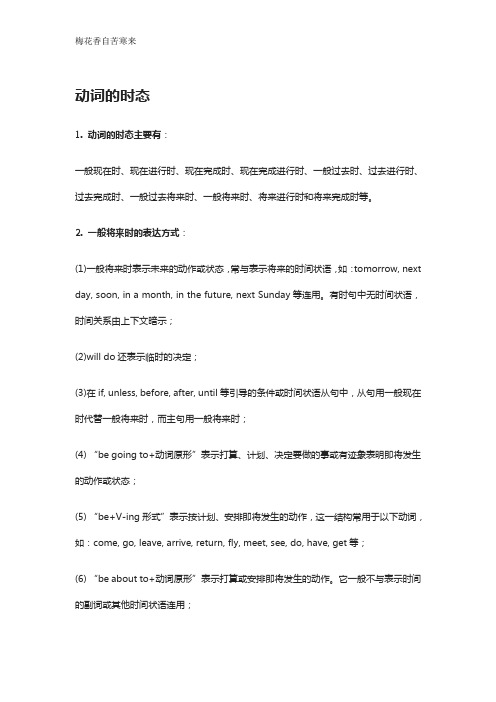
动词的时态1. 动词的时态主要有:一般现在时、现在进行时、现在完成时、现在完成进行时、一般过去时、过去进行时、过去完成时、一般过去将来时、一般将来时、将来进行时和将来完成时等。
2. 一般将来时的表达方式:(1)一般将来时表示未来的动作或状态,常与表示将来的时间状语,如:tomorrow, next day, soon, in a month, in the future, next Sunday等连用。
有时句中无时间状语,时间关系由上下文暗示;(2)will do还表示临时的决定;(3)在if, unless, before, after, until等引导的条件或时间状语从句中,从句用一般现在时代替一般将来时,而主句用一般将来时;(4) “be going to+动词原形”表示打算、计划、决定要做的事或有迹象表明即将发生的动作或状态;(5) “be+V-ing形式”表示按计划、安排即将发生的动作,这一结构常用于以下动词,如:come, go, leave, arrive, return, fly, meet, see, do, have, get等;(6) “be about to+动词原形”表示打算或安排即将发生的动作。
它一般不与表示时间的副词或其他时间状语连用;(7) “be to+动词原形”表示按计划、安排即将发生的动作;(8) 一般现在时表示按时刻表或根据规定将要发生的动作,这一结构常用于表示位移的动词,如:come, go, leave, start, begin, take off, set off等。
动词的语态1. 一般现在时的被动语态:is/am/are+V-ed。
例如:English is widely spoken all over the world.2. 一般过去时的被动语态:was/were+V-ed。
例如:The underground was built five years ago.3. 一般将来时的被动语态:①will/shall be+V-ed。
专题八 动词的时态、语态

③表单纯性的将来,与人的主观愿望和判断无关 时。 If it's made of wood, it will float on water. 这要是木材做的,它能浮在水面上。 (4)当主句为一般将来时态时,在 if, as soon as, until, when等引导的状语从句中用一般现在时代替一 般将来时。 I will call you as soon as I get there. 我一到那儿就给你打电话。
②表示过去经常或反复发生的动作,常与 always , usually, often, 度的时间状语连用。 When I was a child, I often played football in the street. 当我是个孩子的时候,我经常在街上踢足球。 注:表示过去经常发生或反复发生的动作,也可 用 used to或 would+动词原形。 I used to go to the library every Sunday. 我以前每个周日都去图书馆。 never,sometimes等表示频
(5)动词的现在进行时表将来。 常见的动词有 go, come, leave, stay, start等。 Joe is leaving for London. 乔就要动身去伦敦。
(6)be about to do 结构表示客观、马上就要发生 的事,一般不与具体的时间状语连用。 be to do结构表示按职责、义务和要求必须去做 或即将发生的动作。 The plane is about to take off. 飞机就要起飞了。 Jenny is to be married next month. 珍妮下个月 结婚。
When shall we finish homework? 我们应该什么时候完成作业? I shall make a cake for your birthday tomorrow. 明天我将为你的生日制作一个蛋糕。
动词的时态和语态
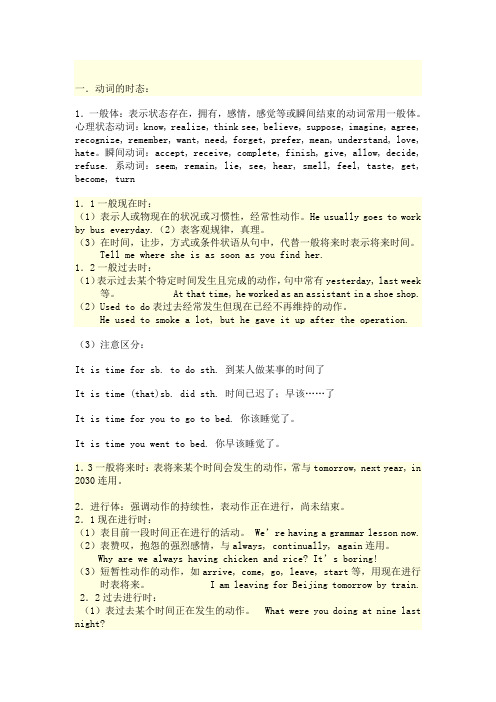
一.动词的时态:1.一般体:表示状态存在,拥有,感情,感觉等或瞬间结束的动词常用一般体。
心理状态动词:know, realize, think see, believe, suppose, imagine, agree, recognize, remember, want, need, forget, prefer, mean, understand, love, hate。
瞬间动词:accept, receive, complete, finish, give, allow, decide, refuse. 系动词:seem, remain, lie, see, hear, smell, feel, taste, get, become, turn1.1一般现在时:(1)表示人或物现在的状况或习惯性,经常性动作。
He usually goes to work by bus everyday.(2)表客观规律,真理。
(3)在时间,让步,方式或条件状语从句中,代替一般将来时表示将来时间。
Tell me where she is as soon as you find her.1.2一般过去时:(1)表示过去某个特定时间发生且完成的动作,句中常有yesterday, last week 等。
At that time, he worked as an assistant in a shoe shop. (2)Used to do表过去经常发生但现在已经不再维持的动作。
He used to smoke a lot, but he gave it up after the operation.(3)注意区分:It is time for sb. to do sth. 到某人做某事的时间了It is time (that)sb. did sth. 时间已迟了;早该……了It is time for you to go to bed. 你该睡觉了。
高三英语高考语法知识点归纳总结动词的时态和语态
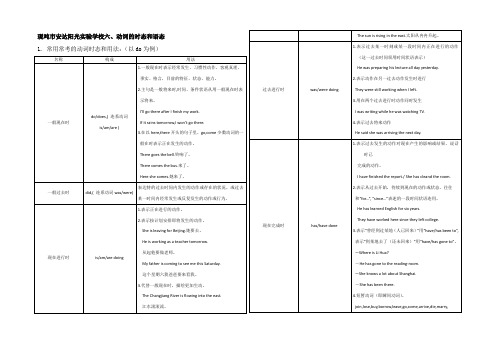
I read the novel last month. (只说明上个月看了,不涉及现在是否记住)
现在完成时与现在完成进行时的比较
着重表示动作的结果时,用现在完成时
I have read that book.我读过那本书了。(知道那本书的内容)
着重表示动作一直在进行,即动作的延续性时,则用现在完成进行时
(只说明他过去当过木匠不涉及到现在)
一般过去时只表达过去的动作或状态
Hello, I ____ you were in London. How long _________ here?
A. don’t know; were you B. hadn’t known; are you
C. haven’t known; areD. didn’t know; have you been
—Hi, Tracy, you look tired.
—I am tired. I _______ the living room all day.
A. paintedB. had painted
C. have been paintingD. have painted
说明:强调动作从过去到现在的延续
— Oh, I’m terribly sorry. _______.
A. I’m not noticing.B. I wasn’t noticing.
C. I haven’t noticed.D. I don’t notice.
说明:对话的后者显然是在解释刚才不小心冒犯对方时正在做的事情.
一般过去时与过去进行时的比较
Here she comes.她来了。
一般过去时
动词的时态和语态

动词的时态和语态清单1 动词时态概述时态是一种动词形式,它是“时”和“体”的组合。
“时”有现在、过去、将来、过去将来之分;“体”有一般、实行、完成、完成实行之别。
高中阶段主要学习这几种时态:一般现在时,一般过去时,一般将来时,过去将来时,现在实行时,过去实行时,现在完成时,过去完成时,现在完成实行时,过去完成实行时和将来完成时。
清单2 动词时态基本用法一、一般现在时1.表示现在经常性、习惯性的动作或状态.如:⑴We have meals three times a day.(现在的习惯)⑵We always help each other. (现在的状态)2.表示客观真理、科学事实.如:⑴The sun rises in the east and sets in the west. ⑵The earth moves around the sun.3.课时安排、交通时刻表,通常用一般现在时表示将来的动作.如:⑴The plane takes off at 8:30.⑵The school begins on September1st.4.表主语的性质、特征、性格和水平等.如:⑴The music sounds wonderful. ⑵The boy is very brave.5.一般现在时还能够用在if, unless引导的条件状语从句中,由when, before, as soon as, the moment, once引导的时间状语从句中,由no matter what/who/which/when/where/how或whatever, whoever, whichever, whenever, wherever however引导的让步状语从句中,这时主句往往表将来(出现will/shall/can/must)或主句是祈使句.⑴I’ll go with you as soon as I finish my work. ⑵If he comes, I’ll let you know it.⑶I’ll call you the moment he comes. ⑷Work hard and you will succeed.⑸Hurry up or you will be late. (祈使句+and/or+陈述句)注意:如果要表达“意愿”时,从句可用将来时.如:⑴If you will give me a hand, I will appreciate it. ⑵If he will listen to me, I will give him some advice.二、一般过去时1.表示过去经常性、习惯性的动作或状态.如:⑴When I was a boy, I often went there.2.含有与一般过去时连用的时间状语.如:yesterday, last week, …ago, …later等. ⑴He was born in 1995.3.在语境中,往往表示“刚才,在过去”之意,暗示现在已“不再这样”.如:⑴—Nancy is not coming today.—But she promised.⑵—You speak very good French! (2009,四川卷)—Thanks. I __A___ French in Sichuan University for four years.A. studiedB. studyC. was studyingD. had studied⑶—The food here is nice enough.(2009,湖南卷)—My friend ___B__ me a right place.A. introducesB. introducedC. had introducesD. was introducing⑷I was out of town at the time, so I don’t know exactly how it ___B____.(2009,山东卷)A. was happeningB. happenedC. happensD. has happened⑸—I’ve got to go now.(2009,重庆卷)—Must you? I __B__ you could stay for dinner with us.A. thinkB. thoughtC. have thoughtD. am thinking⑹Scientists have many theories about how the universe __A__ into being.(2009,北京卷)A. cameB. was comingC. had comeD. would come4.虚拟语气中,but…⑴I might have given you more help, but I was too busy.三、一般将来时1.will+ 动词原形①表示纯粹的将来.如:Tom will come back next week.②表示事物的必然的趋势或结果.如:Fish will die without water.③临时做出的决定.如:⑴—How about going to see our teacher?—Well, I will go with you.⑵—Ann is in hospital. (2009,江苏卷)—Oh, really? I D know. I ____ go and visit her.A. didn’t; am going toB. don’t; wouldC. don’t; willD. didn’t; will2.be going to+动词原形①表示“计划、打算要做某事”. 如:What are you going to do this afternoon?②通过当前迹象表明将要发生某事.(主语为物)如:Look at the dark clouds. It’s going to rain.3.be about to 动词原形①be about to+动词原形=be on the point of doing something,表示“即将,正要,刚要”,该句型很少与时间状语连用.②通常用句型:be about to…when…,刚要……就……4.be to +动词原形①表示要按计划或安排要做的事. 如:She is to get married.②was/were to do something表示过去计划要做某事,但不表明计划是否被执行,或表示命运(即命中注定要发生的事).was/were to have done something表示未曾实现的计划.如:We were to have told you, but you were not in.③表示情态意义,相当于should, ought to, must, have to.意思是“理应,必须”.You are to report to the police. 你应该报警. What is to be done? 应该怎么办呢?④用于第一人称疑问句,表示征求对方意见,相当于shall.如:What are we to do next? =What shall we do next?5.be doing表示按计划、安排将来要发生的动作或状态,但必须是表示位移的一些动词如come, go, stay, arrive, leave, begin, start等.四、现在实行时①表示此时此刻正在实行的动作,其标志性词有look, listen, now, at present, at this moment.②表示现阶段正在实行的动作.如I am doing my homework this morning.③现在实行时与always, constantly, continually连用,表示说话者含有赞赏、厌恶、批评、遗憾等感情色彩.如:He is always thinking of others first. He is constantly making the same mistake.五、过去实行时(其用法同现在实行时)表示某个时间正在发生、实行的动作。
- 1、下载文档前请自行甄别文档内容的完整性,平台不提供额外的编辑、内容补充、找答案等附加服务。
- 2、"仅部分预览"的文档,不可在线预览部分如存在完整性等问题,可反馈申请退款(可完整预览的文档不适用该条件!)。
- 3、如文档侵犯您的权益,请联系客服反馈,我们会尽快为您处理(人工客服工作时间:9:00-18:30)。
2. 主句是一般将来时 ,时间、条件状语从句中用一般现在
表示将来 。如:
I ' ll go there after I finish my work.
If it rains tomorrow, I won ' t go there.
3. 在以here, there 开头的句子里, go, come 等少数动词
begin, return, open, close, depart, end, sail
,
finish 等).
The train starts at ten o ' clock in the morning.
Supper is at five today.精品PPT
二、一般过去时 1 )表达特定的过去时间内发生的动作或存在的状况,
的一般现在时表示正在发生的动作。例如:
There goes the bell. 铃响了。
There comes the bus. 汽车来了。
Here she comes. 她来了。
4. 表示安排或计划好的将来的动作(一般只限于某些表
移动的动词,如 go,come,leave, start,be ,arrive,
常与last week/year/ month/ spring, a few days ago, in 1998 等时间状语以及 when 等连词引
导的时间状语从句连用。 We had a good swim last Sunday. When I was young, I took cold baths regularly.
主动
v. /v.s ved . will + v would + v.
had + Vp.p have /has + Vp.p will have + Vp.p am /is / are + Ving was精品/PwPTere + Ving
一、生、习惯性动作或存在的状态; He takes a walk after supper every day. He is our English teacher.
精品PPT
动词的时态
时态是谓语动词所表示的动 作或情况发生时间的各种形 式。它是“时”和“体”的 组合。“时”有现在、过去、 将来、过去将来之分;“体” 有一般、进行、完成、完成
进行之别。见下表:
精品PPT
?时态 现在
?体
一般 一般现在 时
进行 现在进行 时
完成 现在完成 时
完成 现在完成 进行 进行时
过去
将来
过去将来
一般过去 时
过去进行 时
过去完成 时
过去完成 进行时
一般将来 时
将来进行 时
将来完成 时
将来完成 进行时
一般过去将 来时
过去将来进 行时
过去将来完 成时
过去将来完 成进行时
精品PPT
语态 时态
一般现在时 一般过去时 一般将来时 过去将来时 过去完成时 现在完成时 将来完成时 现在进行时 过去进行时
2 )叙述过去连续发生的一件件事。 He got up early in the morning, fetched water, swept the yard and then went out to work. 3 )表过去某一时间内经常发生或反复发生的动作或 行为。 When my brother was a teenager, he
4. be to do 1) (按计划或安排即将发生 ) The boys are to go to school next week. He and I are to meet at the Shanghai
Railway Station.
精品PPT
这种结构也可用于过去, was / were to do sth 表示曾经计划要做的事,但不表明计划是否被执 行,或表示命运(即命中注定要发生的事),而 非计划; was / were to have done sth 表示未 曾实现的计划。 I felt nervous, I was soon to leave home for the first time. 我感到很紧张,因为我很快就 要首次离开家了。 They said goodbye, little knowing that they were never to meet again. 他们告了别, 不知道以后再也不会见面了。 We were to have told you, but you were not in. 我们本想告诉你的,但你不在家。
tommorrow. ②表示经常发生的动作。 We shall work in this factory every day. ③“will+ 动词原形”表示事物固有的属性或必然 趋势、倾向。 Fish will die without wat精e品r.PPT
④表示说话过程中所做的决定。 —The phone is ringing —I ' ll answer it.
played table tennis almost everyday. 4 )在条件、时间状语从句中表示过去将来的动作。
They said they would精品lePPtTus know if they heard any news about him.
三. 一般将来时
一般将来时表示将来要发生的动作和存在的状 况。有下列一些形式: 1.will/shall +do (侧重将来行为,不突出计划 安排去做某事,与 tomorrow ,next week, soon,in 2018 等连用) ①表示将会出现的动作或状态。 My daughter will be twelve years old
2. be going to do ①表示已经决定或安排好要做某事。 We are going to visit the Museum of Chinese History. ②根据某种迹象认为在最近或将要发生某事。 Tom studies very hard, and he is going to try for a scholarship.
客观真理、科学事实、格言; The sun rises in the east. Two plus two makes four.
主语的特征、性格、能力等。 He woks hard. The children draw well.
常见时间状语: often, sometimes, seldom, always, every day/month/ year
精品PPT
3. be about to+ 动词原形 ①表示即将发生的动作,意为“正要、即将”。 The English evening is about to begin. ②不可与具体的将来时间的副词或副词性短语、但 可以同由 as /when 引导的时间状语从句连用。 She was about to go to cinema when I came.
